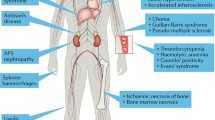Abstract
The past decade has seen an evolution in the way that thrombophilic conditions are diagnosed and understood. This has largely evolved through the detection of single nucleotide polymorphisms in critical regulating proteins that are thought to confer significant structural-functional changes at key points in the coagulation cascade. The antiphospholipid syndrome (APS) is a complex hypercoagulable disorder that as yet defies the possibility of simple, predictive testing
Similar content being viewed by others
References and Recommended Reading
Yamada H, Atsumi T, Kato EH, et al.: Prevalence of diverse antiphospholipid antibodies in women with recurrent spontaneous abortion. Fertil Steril 2003, 80:1276–1278. This paper illustrates the multiple targets for aPL and the apparent multifactorial nature of the disease.
Bertolaccini ML, Sanna G, Ralhan S, et al.: Antibodies directed to protein S in patients with systemic lupus erythematosus: prevalence and clinical significance. Thromb Haemost 2003, 90:636–641.
Arai T, Matsubayashi H, Sugi T, et al.: Anti-annexin A5 antibodies in reproductive failures in relation to antiphospholipid antibodies and phosphatidylserine. Am J Reprod Immunol 2003, 50:202–208.
Zanon E, Saggiorato G, Ramon R, et al.: Anti-prothrombin antibodies as a potential risk factor of recurrent venous thromboembolism. Thromb Haemost 2004, 91:255–258.
Amoroso A, Mitterhofer AP, Del Porto F, et al.: Antibodies to anionic phospholipids and anti-beta2-GPI: association with thrombosis and thrombocytopenia in systemic lupus erythematosus. Hum Immunol 2003, 64:265–273.
Forastiero RR, Martinuzzo ME, Broze GJ: High titers of autoantibodies to tissue factor pathway inhibitor are associated with the antiphospholipid syndrome. J Thromb Haemost 2003, 1:718–724.
Carmo-Pereira S, Bertolaccini ML, Escudero-Contreras A, et al.: Value of IgA anticardiolipin and anti-beta2-glycoprotein I antibody testing in patients with pregnancy morbidity. Ann Rheum Dis 2003, 62:540–543.
Sanmarco M, Alessi MC, Harle JR, et al.: Antibodies to phosphatidylethanolamine as the only antiphospholipid antibodies found in patients with unexplained thromboses. Thromb Haemost 2001, 85:800–805.
Avcin T, Cimaz R, Meroni PL: Recent advances in antiphospholipid antibodies and antiphospholipid syndromes in pediatric populations. Lupus 2002, 11:4–10.
Lopez LR, Dier KJ, Lopez D, et al.: Anti-beta 2-glycoprotein I and antiphosphatidylserine antibodies are predictors of arterial thrombosis in patients with antiphospholipid syndrome. Am J Clin Pathol 2004, 121:142–149.
Nojima J, Kuratsune H, Suehisa E, et al.: Association between the prevalence of antibodies to beta(2)-glycoprotein I, prothrombin, protein C, protein S, and annexin V in patients with systemic lupus erythematosus and thrombotic and thrombocytopenic complications. Clin Chem 2001, 47:1008–1015.
Ong SG, Cheng HM, Soon SC, et al.: IgG anti-beta(2) glycoprotein I antibodies in Malaysian patients with antiphospholipid syndrome and systemic lupus erythematosus: prevalence and clinical correlations. Clin Rheumatol 2002, 21:382–385.
Aguirre V, Cuchacovich R, Barria L, et al.: Prevalence and isotype distribution of antiphospholipid antibodies in Chilean patients with systemic lupus erythematosus (SLE). Lupus 2001, 10:75–80.
Somers E, Magder LS, Petri M: Antiphospholipid antibodies and incidence of venous thrombosis in a cohort of patients with systemic lupus erythematosus. J Rheumatol 2002, 29:2531–2536.
Sebastiani GD, Galeazzi M, Tincani A, et al.: Anticardiolipin and anti-beta2GPI antibodies in a large series of European patients with systemic lupus erythematosus. Prevalence and clinical associations. Scand J Rheumatol 1999, 28:344–351.
Diri E, Cucurull E, Gharavi AE, et al.: Antiphospholipid (Hughes’) syndrome in African-Americans: IgA aCL and abeta2 glycoprotein-I is the most frequent isotype. Lupus 1999, 8:263–268. There may be ethnic diversity in the type and risk significance of aPL suggesting a multifactorial genetic basis.
Cucurull E, Gharavi AE, Diri E, et al.: IgA anticardiolipin and anti-beta2-glycoprotein I are the most prevalent isotypes in African American patients with systemic lupus erythematosus. Am J Med Sci 1999, 318:55–60.
Galli M, Luciani D, Bertolini G, Barbui T: Lupus anticoagulants are stronger risk factors for thrombosis than anticardiolipin antibodies in the antiphospholipid syndrome: a systematic review of the literature. Blood 2003, 101:1827–1832.
Daugas E, Nochy D, Huong du LT, et al.: Antiphospholipid syndrome nephropathy in systemic lupus erythematosus. J Am Soc Nephrol 2002, 13:42–52.
Diz-Kucukkaya R, Hacihanefioglu A, Yenerel M, et al.: Antiphospholipid antibodies and antiphospholipid syndrome in patients presenting with immune thrombocytopenic purpura: a prospective cohort study. Blood 2001, 98:1760–1764. The relationship between the APS and ITP is apparent, but requires further study.
Finazzi G: The epidemiology of the antiphospholipid syndrome: who is at risk? Curr Rheumatol Rep 2001, 3:271–276.
Galli M: Which antiphospholipid antibodies should be measured in the antiphospholipid syndrome? Haemostasis 2000, 30(Suppl 2):57–62.
Lakos G, Kiss E, Regeczy N, et al.: Antiprothrombin and antiannexin V antibodies imply risk of thrombosis in patients with systemic autoimmune diseases. J Rheumatol 2000, 27:924–929.
Ulcova-Gallova Z, Bouse V, Krizanovska K, et al.: Beta 2-glycoprotein I is a good indicator of certain adverse pregnancy conditions. Int J Fertil Womens Med 2001, 46:304–308.
Song KS, Park YS, Kim HK: Prevalence of anti-protein S antibodies in patients with systemic lupus erythematosus. Arthritis Rheum 2000, 43:557–560.
Erkan D, Zhang HW, Shriky RC, Merrill JT: Dual antibody reactivity to beta2-glycoprotein I and protein S: increased association with thrombotic events in the antiphospholipid syndrome. Lupus 2002, 11:215–220.
Munoz-Rodriguez FJ, Reverter JC, Font J, et al.: Clinical significance of acquired activated protein C resistance in patients with systemic lupus erythematosus. Lupus 2002, 11:730–735.
Nojima J, Kuratsune H, Suehisa E, et al.: Acquired activated protein C resistance associated with anti-protein S antibody as a strong risk factor for DVT in non-SLE patients. Thromb Haemost 2002, 88:716–722.
Nojima J, Kuratsune H, Suehisa E, et al.: Anti-prothrombin antibodies combined with lupus anti-coagulant activity is an essential risk factor for venous thromboembolism in patients with systemic lupus erythematosus. Br J Haematol 2001, 114:647–654.
Wilson WA, Gharavi AE, Koike T, et al.: International consensus statement on preliminary classification criteria for definite antiphospholipid syndrome: report of an international workshop. Arthritis Rheum 1999, 42:1309–1311.
Author information
Authors and Affiliations
Rights and permissions
About this article
Cite this article
Merrill, J.T. Diagnosis of the antiphospholipid syndrome: How far to go?. Curr Rheumatol Rep 6, 469–472 (2004). https://doi.org/10.1007/s11926-004-0027-y
Issue Date:
DOI: https://doi.org/10.1007/s11926-004-0027-y




